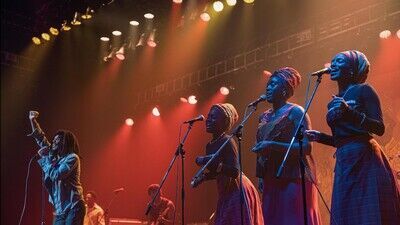
“I want to give you some good, good lovin’”
The film portrays Rita as Bob’s background singer, confidant and mother to children who were hers and who she inherited through infidelity. Rita supported Bob on international tours and in raising children while pursuing her own music career.
Lashana Lynch, who plays Rita Marley in “One Love,” exudes Rita’s aura perfectly. The audience feels her longing to be a good friend to Bob, while also feeling the sensitivity around her frustration of being his soldier, too. A Rastafarian queen, Rita exemplifies audacious love, and Lashana gives her character justice.
While staying on the compound, I noticed that the work of the women was expected to be consistent, but not praised loudly. As a cultural observer volunteering on the compound, I always wanted to shout “These women deserve more!” but I was merely an observer. I felt spiritually connected to Cedella Marley Booker, born July 23rd, and Rita Marley, born July 25th, because my birthday is July 24th. Unbeknownst to me until I arrived at the compound during the month of our birthdays, that history inspired me to host a “Leo” celebration in their honor for the entire village to eat, drink, dance, and be merry in light of the work that those women had accomplished. I did not know how hard it was to feed and uplift a village for just one night, and after doing it, all I could do was shout “These women deserve more!” More money, more hugs, and more international praise.
“None but ourselves can free our minds”
After spending a few months amongst the Rastafarian people of Bob Marley’s birth and resting place in St. Ann’s Parish, coined “Reggaeland,” I learned a substantial amount about the religion and political movement.
Like most major religions with a hierarchical man god, Rastafarianism is based on Ethiopian leader Haile Selassie I, who is believed to have returned to redeem all Black people. Religion based solely on the idea of one all-powerful man is often discriminatory in nature towards those who identify as women. Known to be a bit patriarchal, Rastas are dedicated to their hair, the food they eat, and hypermasculinity. Rastafarian women are housekeepers, nannies, teachers, healers, soldiers, and businesswomen, who occasionally rest to have a smoke and banter.

